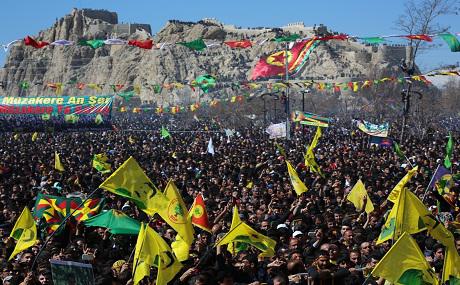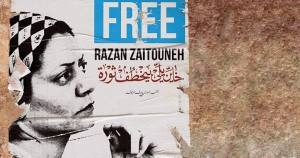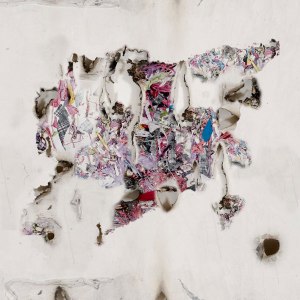Blog Archives
SYRIA: Syria’s forgotten revolutionaries: an interview with Leila Al-Shami
 June 22, 2016, Source: bookwitty
June 22, 2016, Source: bookwitty
Patrick Ward
In 2011 the Arab Spring swept the Middle East and North Africa. Millions of people rose up against dictatorships across the region, toppling governments in Egypt, Tunisia and Yemen, with the Libyan regime also falling following Western intervention. Among the countries in which revolution seemed to be on the cards was of course Syria. But, five years later, the country is in turmoil, with President Bashar Al-Assad clinging to the power he has left with the backing of the military might of Russia, Iran, Hezbollah and others. Facing them are reactionary Islamist forces such as Islamic State/Daesh and Jabhat Al-Nusra. The situation looks increasingly hopeless, and it is generally portrayed in the media as a battle between equally horrific forces, with ordinary people reduced to spectators desperately attempting to avoid barrel bombs or making terrifying journeys out of the country as refugees.
But there is a side to the story that is often overlooked – that of the continued resilience and self-organisation of Syrians resisting both the regime and groups like ISIS. This is the subject of Burning Country: Syrians in Revolution and War by Leila Al-Shami and Robin Yassin-Kassab, a comprehensive account of Syria’s recent history told often through the stories of people on the ground.
I spoke to Al-Shami about why contesting the prevalent narratives on Syria is so important. Read the rest of this entry
KURDISTAN: Kurdistan democratic confederalists
Source: Anarchy in Action

Photo: taku.net
With a population of 30 million, the Kurds are the world’s largest stateless people. They form the majority of Kurdistan, a region in Turkey, Iran, Syria and Iraq. Since 1999, their struggle for self-determination has taken an anarchstic turn, and communities in Kurdistan have established direct democratic governance modelled on the anti-authoritarian neo-Zapatista movement and the theories of US anarchist Murray Bookchin. While Kurds comprise the majority, the movement has been diverse and multi-ethnic. For example, in the canton of Jazira in Rojava (Syrian Kurdistan), Kurds, Arabs, Syriacs, Chechens, Armenians, Muslims, Christians and Yazidis co-exist and share political power.[1]
SYRIA: Film – Ecos del Desgarro
A self-managed and collective documentary about the Syrian revolution
and counter revolution, interviewing Syrian activists.
In Spanish/Arabic with English subtitles
Source: http://camaranegra.espivblogs.net/
SYRIA: Who’s Afraid of Razan Zaitouneh?
There was a time, not too long ago, when a young woman headed one of the largest networks of Syrian activists working against the Assad regime. She had blue eyes and uncovered blond hair; she spoke English and held a degree in law; and she was a staunch secularist. But Razan Zaitouneh was utterly uninterested in showcasing any of these ‘qualities’, or in becoming an international icon. She believed in the universality of freedom and human rights, but it was only through very local battles that she thought such values could acquire life and meaning. Read the rest of this entry
The experiment of West Kurdistan (Syrian Kurdistan) has proved that people can make changes
 [NB. we caution against over-idealization of PKK/PYD by some western anarchists but believe there are many important struggles happening in Kurdistan worthy of support]
[NB. we caution against over-idealization of PKK/PYD by some western anarchists but believe there are many important struggles happening in Kurdistan worthy of support]
An interesting report by Zaher Baher of Haringey Solidarity Group and Kurdistan Anarchists Forum who spent two weeks in Syrian Kurdistan, looking at the experiences of self-government in the region
What you read below is the experience of my visit, for a couple of weeks in May this year, 2014, to North East of Syria or Syrian Kurdistan (West of Kurdistan) with a close friend of mine.
Throughout the visit we had the total freedom and opportunity to see and speak to whoever we wanted to. This includes women, men, youth, and the political parties. There are over 20 parties from Kurdish to Christian, of which some are in the Democratic Self Administration (DSA) or Democratic Self Management (DSM) of the region of Al Jazera. Al Jazera is one of three regions, (cantons) of West Kurdistan. We also met the Kurdish and Christian political parties who are not in the DSA or DSM. In addition, we met the top people from the Democratic Self Administration (DSM), members of the different committees, local groups and communes as well as businesspeople, shopkeepers, workers, people in the market and people who were just walking in the street. Read the rest of this entry
سوريا في ثورة
بقلم صادق جلال العظم
ترجمة: مروان زكريا
فاجأتني انتفاضة الشعب في وجه نظام عائلة الأسد العسكري ودولته الأمنية في سورية. خشيت في البداية أن يقوم النظام بسحقها بشكل شبه فوري، بسبب شراسته وقمعيته الأسطوريتين. وكغيري من المثقفين السوريين، شعرت بعجز تام أمام هذا الوحش الضاري، الذي كان يدفن أي صوت جماعي على وشك أن يقول “لا” أو حتى يضمر نية قولها.
وتفاجأت بالثورة مخطئاً. إذ بشرت الوقائع والمشاهدات اليومية بحدوث أزمة حاول الكثير من السوريين جاهدين إنكارها. وإنكارها هو ما فعلناه، وسأشرح ذلك.
SYRIA: Syria in Revolt: Understanding the Unthinkable War
By Sadik J Al-Azm
The people’s intifada in Syria, against the military regime and police state of the Assad family, took me by surprise. I was fearful at first that the regime would crush it almost instantly, given its legendary ferocity and repressiveness. Like other Syrian intellectuals, I felt total impotence before this devouring monster, which precluded any thought of an imminent, or even possible, collective “no.”
I was surprised by the revolution, but I should not have been. Daily experiences and recurrent observations foretold a crisis that many Syrians tried hard to deny. And deny we did. Let me explain. Read the rest of this entry
SYRIA: The Deir Al Zour Intifada against Daesh
By Leila Al Shami
Syrians have repeatedly shown that they refuse to accept the tyrannies of either Bashar Al Assad or any extremist group that tries to impose its vision upon them. In the last couple of months, strengthened by American and Iraqi army weapons captured in Iraq, the Islamic State (formally ISIS and known locally as Daesh) has made dramatic gains in north and eastern Syria. Where it has gone it has imposed its hate-filled, reactionary interpretation of Islamic Law and severe restrictions on local people, committed sectarian massacres and other atrocities such as crucifixions and beheadings, and assassinated and imprisoned revolutionaries. But in the eastern province of Deir Al Zour, close to the Iraqi border, local popular resistance is now doing what the Syrian regime and American-funded Iraqi army failed to do; it is forcing Daesh out. Read the rest of this entry
SYRIA: Statement of solidarity with the Syrian revolution
To sign on to this statement please email: srsbases@gmail.com
Scroll down for other languages and list of signatures
As Syrians mark the first anniversary of the Assad regime’s chemical attacks on Al Ghouta, which caused the death of several hundred people, we the undersigned stand in solidarity with the millions of Syrians who have struggled for dignity and freedom since March 2011. We call on the people of the world to act in support of the revolution and its goals, demanding the immediate end of the violence and the end of the illegitimate Assad regime. Read the rest of this entry
سوريا: عمر عزيز و نهاية المثقف
بقلم مازن كم الماز
لا يمكن تصنيف عمر عزيز ( ولد في دمشق 1949 و قضى في سجون الأسد في شباط 2013 ) بسهولة , فالرجل , الذي مرت ذكرى غيابه الأولى في شباط الماضي , لم يكن فقط خارجا على الأنماط التقليدية للفكر السياسي و الثقافي , لقد كانت حياته و موته تجسيدا لهذا النفي , و محاولة لممارسة ثقافة بديلة بالفعل عن ثقافة السلطة السائدة , عن الثقافة السائدة .. في مجتمع الفرجة , الاستعراض , الصورة , الإعلام المرئي و المكتوب , الخ , حيث رأس المال يحتل مركز كل شيء دون منافس , أصبحت “الثقافة السائدة” قادرة على احتواء أي خصم لها , أن تقطع صلته بالناس و بالشارع و أن تنفي عنه في نهاية المطاف صفة البديل التحرري و الجماهيري .. و عوضا عن التنافس الأولي مع المؤسسات السلطوية الأمنية و البيروقراطية , أصبح دور الفضائيات و المنظمات غير الحكومية يكمل دور تلك المؤسسات السلطوية في ابتذال و احتواء محاولات إنتاج بديل عن الثقافة السائدة , في بقرطته و رشوته و تحويله إلى صورة أخرى منفصلة عن المتلقي , صورة تخدم وظيفة الإبقاء على المتلقي في حالته السلبية المنفعلة , إنها نفس لعنة النيوليبرالية التي نقلت إلى “منظمات المجتمع المدني” ذلك الجزء المرهق و الأقل إقناعا من وظائف المؤسسات السلطوية , “الثقافية” هنا , و نفس لعنة مجتمع المشهد كما سماه غي ديبورد , حيث الصورة تحل مكان الحياة , و الاستهلاك مكان الإبداع .. لا شك أن المثقف الهامشي قد وجد من قبل , في الشارع , بين الناس , خارج أسوار المؤسسات التابعة للسلطة أو نقيضها الشبيه : المعارضة , لكن عمر عزيز يمثل نقلة جديدة في هذا “المثقف” اللامؤسساتي , الهامشي , المختلف , المسكون بمقاومة السائد و إنتاج البديل التحرري … عمر عزيز القادم من العالم الأول إلى غمار الثورة السورية , الذي حلم بالمجالس المحلية كبديل قاعدي أفقي عن مؤسسات النظام القمعية و الأمنية , الرجل الذي رفض تبرير قمع المجتمع على يد “النظام” بحالة الاستثناء , تحول هو نفسه إلى استثناء مهم ربما , لكل الأنماط أو التصنيفات الدارجة .. و كما هو عصي على التوصيف , فإن عمر عزيز عصي على الرثاء , فكما لا يمكن وصفه بأي من الأوصاف الدارجة للسياسيين أو المثقفين , لا يمكن أيضا رثاءه بعبارات الرثاء التقليدية , فعمر عزيز لم يكن قائدا و لا مرشدا و لا بطلا أو شهيدا بالمعنى التقليدي , كان باختصار إنسان حلم بحريته , و عاش و مات في سبيل ذلك
المصدر: الحوار المتمدن



